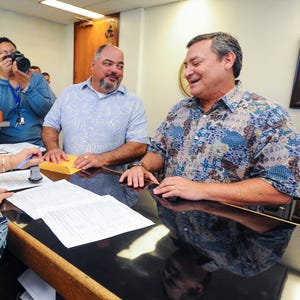Task force leaders for the three options for decolonization spoke at a forum Thursday.
Former Sen. Edward Duenas, chairman for the Guam Statehood Task Force; Joe Garrido, chairman of Guam Free Association Task Force; and Victoria-Lola Leon Guerrero, co-chair for the Independence Task Force, spoke during a forum of the Festival of Pacific Arts at the University of Guam lecture hall.
Each member was given 20 minutes to make the case on why their option would be the best for Guam.
Duenas said becoming a state would mean a lot of financial benefits for Guam. One of the biggest would be the payment for the Earned Income Tax Credit, which costs the local government millions. If Guam becomes a state, the federal government would pay those taxes and not Guam, he said.
Guam also would be fully a part of Social Security program, which it isn’t now, he said.
Garrido said free association is a good option because Guam still can have a relationship with the U.S., but on its own terms. He argued that free association was a good option because it’s one that the U.S. would probably be more open to approve, as it’s been done before.
He said he’s hopeful something can be done about Guam’s political status in the future, but isn’t sure it will happen in his lifetime.
“I hope it happens,” he said.
He said, looking at the Hawaiians and their struggle for their rights as a U.S. state, shows that option isn’t so good. And independence could mean being cut off from U.S. help altogether, he said.
Leon Guerrero said independence is a great option. For example, the Philippines — a former U.S. colony — is a thriving independent country.
She said Guam being independent would mean it would have absolute say over its affairs, but doesn’t necessarily mean the U.S. will be gone. It just means Guam can have a say in what the U.S. does to and in its lands.
Possible plebiscite
Gov. Eddie Calvo, the chairman of the Commission on Decolonization, announced in March a plan to possibly hold a political status vote during the November election. The plebiscite would be a nonbinding vote, intended to measure the preferred political status of Guam — statehood, independence or free association. It hasn’t been decided whether the vote will be held.
Calvo, in a release last month, thanked those who put together the literature for the education campaign.
“This information will help educate our community on what it means for a people to determine their political status for themselves and not simply accept the status given to them,” Calvo stated in the release.
In his State of the Island address in late March, the governor said an education campaign would take place until July to inform voters about the plebiscite. The impact of the campaign would be assessed in July.



No comments:
Post a Comment